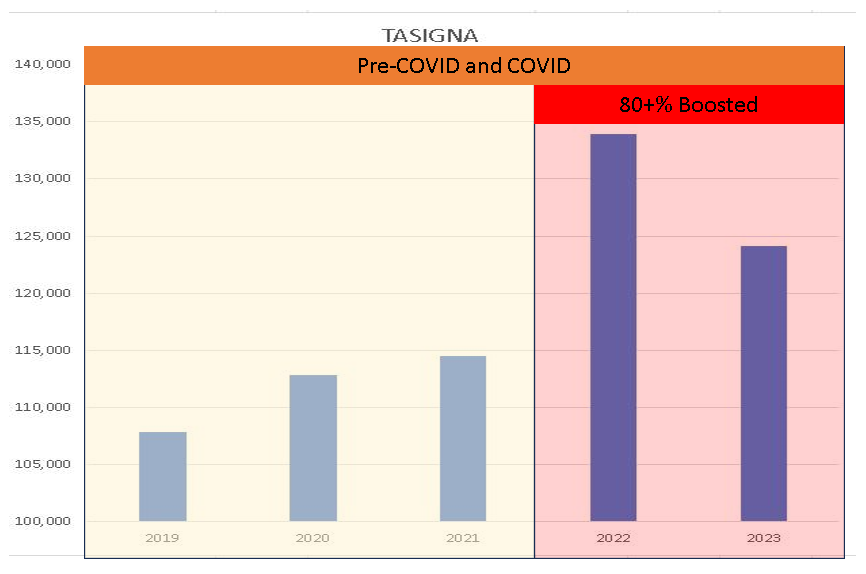Switzerland, reputed for its high standard of living and healthcare system, encountered an alarming upsurge in cancer cases in 2022. In a presentation (translated video above) by health economist Prof Dr Konstantin Beck of the University of Lucerne on 5th Dec 2023, there was a striking increase magnitudes higher than population growth factors could explain. (By the way, I did a quick translation and edited the video for Prof Beck's slides, so please excuse any untidiness.)
Beck revealed the shocking statistics in a presentation, raising questions about the credibility of official data and sparking a discourse on potential causes behind the spike.
As Beck underscores, “These health problems cannot have been that great, because at least half of this third describes themselves as happy.” This encapsulated 2022's paradox—the majority of Swiss people felt healthy and happy per the Swiss Health Surveys, despite the strain of chronic illnesses on the populace.
Swiss Federal Office caught manipulating surveys?
However, the Federal Office's initial release showed a staggering jump in the self-reported prevalence of major illnesses such as heart attack, stroke, and notably cancer—from about 117,000 in 2017 to nearly 461,000 in 2022. “It rises by a factor of 4 to 5. It's a dramatic increase,” Beck explained.
While an age-adjusted calculation revised these numbers down significantly, they still implied an increase of 335,000 additional cancer cases—presenting a potential crisis significantly outpacing the infrastructure's capacity. “If this were the case... our cancer care and our cardiac infrastructure would probably be at their limits, if not collapsed,” Beck stated.
The Federal Statistical Office then retracted the 2017 data citing a lack of comparability with the 2022 health surveys. They did not elaborate on the reasons, prompting further queries for clarification.
Upon further investigation, it became apparent that the discrepancy arose from a change in survey questions: the 2017 survey asked if individuals had experienced certain diseases in the previous year, whereas the 2022 survey asked if they had ever experienced those same diseases or health issues at any point in their lives.
Professor Beck questions why they changed the question, undermining the ability to compare data.
Private Insurance Provider Data shows alarming increase in number of individuals taking cancer medications.
However, data from Helsana, a private health insurance provider, corroborated the worrisome trend. Their statistics showed the number of individuals taking cancer medication doubled from previous years—a 94% increase in 2022. Beck notes a marked divergence in standard fluctuations, with “a massive increase in the year 2021, 2022 to over 150,000 cases.”
The immediacy of this increase post-2020 introduces vaccination as a potential factor. "Does it take that long until COVID has an effect? And also then one must say, yes, then but the vaccination was not able to prevent the severe courses that lead to cancer,” Beck pondered.
While no definitive association between these cancer rates and COVID-19 vaccinations is established by the statistics, the parallel of timelines provokes questions and demands further investigation.
Prof Dr Konstantin Beck's revelations expose a concerning health trend within Switzerland, bringing crucial discussion points to the table—
Why was such significant data mishandled?
What are the potential causes behind this cancer case proliferation?
What measures can and should be taken in response to support the nation’s healthcare infrastructure faced with this potential crisis?
The rise of cancer cases in Switzerland indeed paints a worrisome health landscape for 2022, urging a need for clarity, accountability, and action.
A preview into Singapore’s 2023 Drug Sales Data
I reached out to former colleagues in the pharmaceutical industry to obtain the most recent pharmaceutical sales figures. Singapore maintains highly controlled dataset, and with over 80% of its population having received booster shots from Pfizer/Moderna, it presents a unique case for analysis. Below is a snippet of the information I received, which pertains to the sales of Tasigna, a medication used in the treatment of chronic myeloid leukemia (a type of blood cancer).
**BTW, 2023 data is incomplete**
Regrettably, I find myself in a position where I need to generate some income. As many of you are aware, I've been out of work, dedicating my efforts to uncovering and sharing the truth. Over the course of 2023, my monthly income has averaged around 400, solely from the generosity of donors – for which I'm immensely grateful to my current paying subscribers. However, the reality is that making ends meet on 400 a month is quite difficult, and after three years my savings have been depleted and I have accrued debts.
With this in mind, I've made the decision to offer the sales analysis data to my paid subscribers via email. It is my hope that in the future I will have sufficient support to be able to share such valuable information freely. I appreciate your understanding and support. If you're interested in receiving the in-depth sales analysis, please consider subscribing!
I will be looking into the following sales data - blood thinners, heart medications, neurological medications and other cancer drugs!
Signing off for now
A17
PS: If you appreciate my work, please consider buying me a coffee here!












